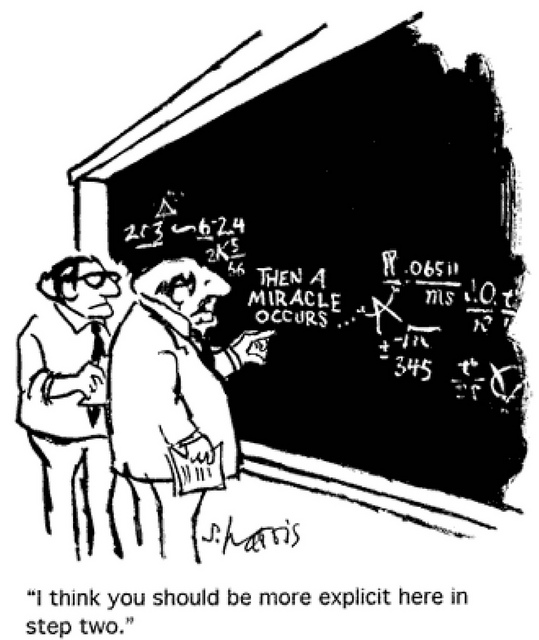Contrary to oft-promoted views, it isn't dumb people who reject science, any more than it is dumb people who reject religion - instead, it is often very smart ones. The anti-vaccine movement, for example, is not evident in relatively poor, less-educated Alabama whereas it is rampant in wealthy, educated progressive counties in California; those people think taking vaccines is for the illiterate. Wealthy elites also believe conventional food is for the less insightful masses.
Given the wealth of data that shows that wealth and education have nothing to do with science acceptance, it is only a surprise that sociologists are "surprised" that science acceptance is à la carte. A new paper using survey data from the General Social Survey finds that about 20 percent of America is deeply religious and has a keen grasp of science and appreciate its benefits - but still deny some of it when it comes to evolution.

Cartoonists get it but society does not collapse if not everyone does.
Some calibration is in order. Despite claims that get made far too often, really only about 15 percent of people outright reject evolution - and specifically natural selection - but they often are not too dumb to get it. Like some atheists know the Bible better than most religious people, lots of evolution deniers know just enough biology to miss the point. On the other side, far more claim to accept it yet what they know about adaptive radiation is nothing, they simply take it on faith and there is nothing inherently superior to blind faith in science instead of religion. Some people with perfectly reasoned grasp of geology, radioactivity, planetary motion, genetics, and probability still prefer the idea of human exceptionalism. This puzzles sociologists yet again in an American Sociological Review paper, though to scientists lots of things are puzzling, such as why Chinese cars will not start causing climate change until 2030 but American ones do right now - or why people think organic milk is any different than any other milk or why homeopathy is still a thing 300 years after it was debunked.
“This finding is particularly interesting because these people who view both science and religion favorably — people who hold what we call a post-secular perspective — have relatively high levels of education and income, and many social scientists assume that high levels of education and income, as well as positive views of science are incompatible with religiosity," said Timothy L. O’Brien, an assistant professor of sociology at the University of Evansville and the lead author of the paper, implying that sociologists tend to be more biased than scientists or the general public.
As part of their survey analysis, O’Brien and his co-author Shiri Noy, an assistant professor of sociology at the University of Wyoming, looked at results from the GSS in 2006, 2008 and 2010 and determined that U.S. adults hold one of three perspectives based on their knowledge and attitudes about science and religion. 21 percent hold a post-secular perspective, which values both science and religion, but which rejects science in favor of religion when it comes to topics such as creation and evolution. 43 percent hold a traditional perspective, which favors religion over science, and 36 percent hold a modern perspective, which favors science over religion.
“These three worldviews are held across religious groups, political parties, and social classes,” according to O’Brien, who said social scientists have typically focused on studying people’s perspectives on science or views on religion separately rather than looking at them simultaneously. “Ours is the first study of the U.S. public that examines perspectives on science and religion in tandem. In doing so, our study uncovers a previously unidentified group of well-informed people who are appreciative of science and technology’s social uses, but who are deeply religious and who reject certain scientific theories in favor of religious ones.”
Among these post-seculars, more than 90 percent agree with contemporary scientific theories about geology, radioactivity, and planetary motion, but only 6 percent believe that the universe began with a huge explosion. Even fewer — 3 percent of post-seculars — agree that humans evolved from earlier animals.
48 percent of post-seculars believe that the Bible is the literal word of God, compared to 31
percent of all U.S.adults, 46 percent of traditionals, and 3 percent of moderns. Post-seculars also report the greatest strength of religious affiliation as compared to traditionals and moderns.
“Our findings indicate that post-seculars are the most religious,” O’Brien said.
In terms of the study’s implications, the research “shows that differences in people’s views of science and religion do not necessarily reflect a lack of knowledge or understanding,” said O’Brien, who emphasized that “post-seculars are scientifically literate” yet still reject scientific explanations of the origins of human life and the universe. “This suggests that bridging gaps between different groups of people may have less to do with reducing knowledge deficits among them and more to do with increasing empathy for and awareness of different lifestyles and cultural preferences.”
In short, deficit thinking is in its 50,000th year of not changing any minds in modern humans. Sociologists can readily accept a gender named 'Other' but still have to learn that faith and science are not in separate boxes.
Funding for the paper came from the National Science Foundation.





Comments